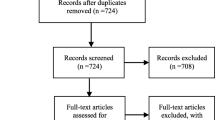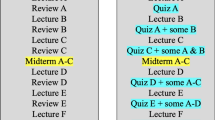Abstract
Medical students need a practical grasp of the key concepts necessary to engage in evidence-based clinical practice, alongside ongoing opportunities for deliberate practice of these skills. We developed a longitudinal, multimodal, evidence-based medicine curriculum for medical students using a “curriculum cascade” that allows learners to apply progressively complex knowledge and skills over time and that fosters the ongoing practice of lifelong learning. Students were integrally involved in both the design and revisions of the curriculum. Real-time and longitudinal feedback mechanisms were used to pursue ongoing curricular improvement. Results after 5 years of curriculum design and improvement have been positive.

Similar content being viewed by others
References
Guyatt GH, Oxman AD, Vist G, Kunz R, Brozek J, Alonso-Coello P, et al. GRADE guidelines: 4. Rating the quality of evidence—study limitations (risk of bias). J Clin Epidemiol. 2011;64:407–15.
Dawes M, Summerskill W, Glasziou P, Cartabellotta A, Martin J, Hopayian K, et al. Sicily statement on evidence-based practice. BMC Med Educ. 2005;5:1–7.
Ahmadi S-F, Baradaran HR, Ahmadi E. Effectiveness of teaching evidence-based medicine to undergraduate medical students: a BEME systematic review. Med Teach. 2015;37(1):21–30.
Ilic D, Maloney S. Methods of teaching medical trainees evidence-based medicine: a systematic review. Med Educ. 2014;48:124–35.
Young T, Rohwer A, Volmink J, Clarke M. What are the effects of teaching evidence-based healthcare (EBHC)? Overview of systematic reviews. PLoS One. 2014;9(1):e86706.
Hsih KW, Iscoe MS, Lupton JR, Mains TE, Nayar SK, Orlando MS, et al. The student curriculum review team: how we catalyze curricular changes through a student-centered approach. Med Teach. 2014;37(11):1008–12.
Fujikawa H, Wong J, Kurihara H, Kitamura K, Nishigori H. Why do students participate in medical education? Clin Teach. 2015;12:46–9.
Weberschock TB, Ginn TC, Reinhold J, Strametz R, Krug D, Bergold M, et al. Change in knowledge and skills of year 3 undergraduates in evidence-based medicine seminars. Med Educ. 2005;39:665–71.
Rees E, Sinha Y, Chitnis A, Archer J, Fotheringham V, Renwick S. Peer-teaching of evidence-based medicine. Clin Teach. 2014;11:259–63.
Behavioral and social science foundations for future physicians. Association of American Medical Colleges. 2011. https://www.aamc.org/download/271020/data/behavioralandsocialsciencefoundationsforfuturephysicians.pdf. Accessed 06 Sept 2017.
A trusted credential: based on core competencies. American Board of Medical Specialties. 2017. http://www.abms.org/board-certification/a-trusted-credential/based-on-core-competencies/. Accessed 06 Sept 2017.
United States Medical Licensing Exam physician tasks/competencies. Federation of State Medical Boards of the United States, Inc. and National Board of Medical Examiners. 2014. http://www.usmle.org/pdfs/tcom.pdf. Accessed 06 Sept 2017
Horton NJ, Switzer SS. Statistical methods in the journal [letter]. NEJM. 2005;353(18):1977–9.
Keen MK. Evidence-based medicine competencies [capstone]. In: Oregon Health & Science University Scholar Archive. 2007. http://digitalcommons.ohsu.edu/cgi/viewcontent.cgi?article=1614&context=etd. Accessed 06 Sept 2017.
Windish DM, Huot SJ, Green ML. Medicine residents’ understanding of the biostatistics and results in the medical literature. JAMA. 2007;298(9):1010–22.
Rysavy M, Carvour M, Pizzimenti M, Ferguson K, Spreen M, Shibli-Rahhal A. Development of an evidence-based clinical practice curriculum for first-year medical students: one school’s experience [poster]. Association of American Medical Colleges Central Group on Educational Affairs Regional Spring Meeting. 2013.
Rowat J, Rysavy M, Carvour M. A novel approach to teaching an evidence-based clinical practice curriculum [poster]. Association of American Medical Colleges Central Group on Educational Affairs Regional Spring Meeting. 2013.
Englander R, Flynn T, Call S, Carraccio C, Cleary L, Fulton TB, et al. Toward defining the foundation of the MD degree: core entrustable professional activities for entering residency. Acad Med. 2016;91(10):1352–8.
Acknowledgements
The authors would like to thank Amy E. Blevins, MALS and Kathy Foss for their help with the curriculum transition as well as Kristi J. Ferguson, PhD, Professor of General Internal Medicine and Director of the Office of Consultation and Research in Medical Education (OCRME); Susan Lenoch, MA, Associate Director of OCRME; and Marc A. Pizzimenti, PhD, Assistant Professor of Anatomy and Cell Biology for their ideas and support.
Author information
Authors and Affiliations
Corresponding author
Ethics declarations
Conflict of Interest
The authors declare that they have no conflict of interest.
Ethical Approval
All procedures performed in studies involving human participants were in accordance with the ethical standards of the institutional and/or national research committee and with the 1964 Helsinki Declaration and its later amendments or comparable ethical standards. For this type of study, formal consent is not required. This article does not contain any studies with animals performed by any of the authors.
Rights and permissions
About this article
Cite this article
Carvour, M.L., Rysavy, M.A., Wilson, M.C. et al. Development of an Integrated Evidence-Based Medicine Curriculum Using a “Cascade” Model. Med.Sci.Educ. 28, 221–226 (2018). https://doi.org/10.1007/s40670-017-0496-z
Published:
Issue Date:
DOI: https://doi.org/10.1007/s40670-017-0496-z




